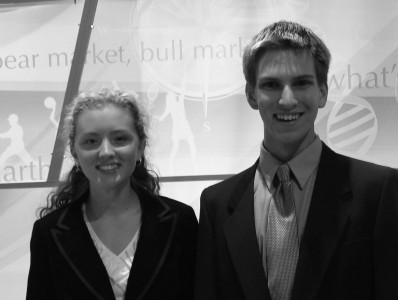
On Oct. 23, the Siemens Foundation announced the Semi-Finalists and Regional Finalists for the 2010 Siemens Competition in Math, Science, and Technology.
Out of 700 individual entrants, Josh Greenberg ’11 and Rachel Myers ’11 were named as two of the 100 national semi finalists. Only five of the semi finalists were from Connecticut. The Siemens Competition in Math, Science, and Technology is an initiative by the Siemens Foundation, which provides “more than $7 million annually in support of educational initiatives in the areas of science, technology, engineering and math in the United States,” according to the Siemens Foundation’s website. When Myers found out that she had been chosen as a semi finalist, she was extremely happy. “I was so excited and felt very lucky to have been chosen,” Myers said.
Of Greenberg’s involvement in the competition, he said, “The Siemens Competition is one of the most prestigious science competitions in the nation. I thought it would be an interesting experience [in which to participate].”
Greenberg and Myers spent many hours in the lab to prepare their research for review by Siemens. Under the guidance of their mentors, Postdoctoral Associate of Rockefeller University Dr. Aaron Steiner and ASR and Physics teacher Nick Morgan, Greenberg and Myers developed unique projects that meshed their own interests with current issues. Sparked by an interest in curing hearing loss, Greenberg researched a system that could potentially reverse the effects of hearing loss.
“In this day and age, classified by some as the iPod generation, hearing loss is going to become more prevalent than ever before,” Greenberg said.
Greenberg explained his project.
“In the ear, we have about 17,000 little hairs that vibrate in rhythm with surrounding sound waves. These vibrations are translated by the brain into the sounds that we process. Unfortunately, when we are exposed to sounds that are too loud, these little hairs vibrate too much and die. These hair cells also die as a result of ototoxic drugs [chemotherapy drugs] and with aging.
“My project dealt with trying to find progenitor cells in zebra fish that are responsible for giving rise to new hair cells. The ultimate goal of my project would be to identify similar cells in humans and try to find a way to make those cells differentiate to replenish dead hair cells and cure deafness.”
Myers’ project was completed as part of the ASR curriculum, which requires all members to submit their projects to the Siemens Competition. She conducted much of her research over the course of a summer program at Michigan State University.
“I took a computer program that three students had written as a class project as a demonstration, and expanded it,” Myers said of her project.
“The original program modeled concentrations of different elements in a star over time, according to the progress of one specific nuclear reaction under one set of conditions.”
Myers modified the program to account for “different temperatures, densities and initial concentrations of elements” within the star, during different nuclear reactions, when modeling the makeup of chemical elements.
Morgan, Myers’ ASR teacher and a scientific researcher himself, was very pleased with her success.
“Rachel performed some impressive work during her research internship at Michigan State, and her semi-finalist status is well deserved. She made the most of this unique opportunity and I’m proud of her,” Morgan said.
The end results of Myers’ and Greenberg’s projects were about thirty pages of “research, along with an abstract [and] an executive summary” of their findings. National winners of the contest will be announced on Monday, Dec. 6 via web cast on the Siemens Competition website.














































Mary Evslin • Dec 4, 2010 at 4:25 pm
Josh, I have a granddaughter who is one and has moderate hearing loss. It is genetic and may get worse. We are thrilled to see people doing the kind of research you are doing. Please do keep it up. Baby Lily needs your help. Grandma Mimi